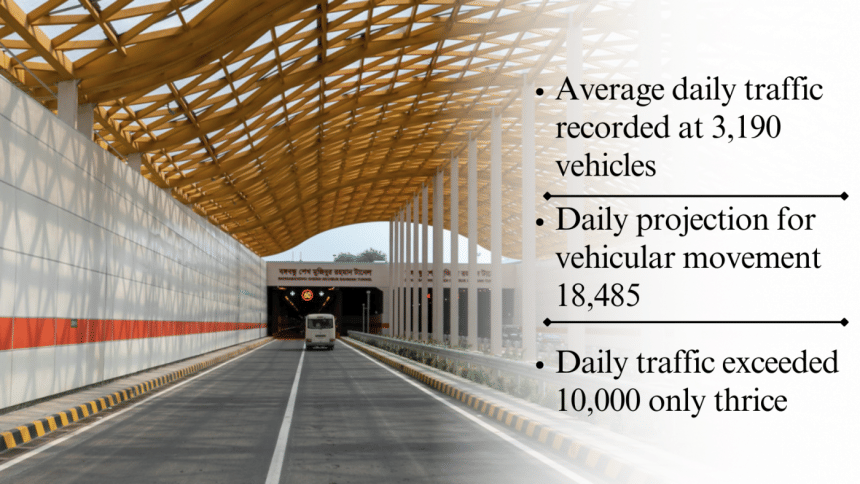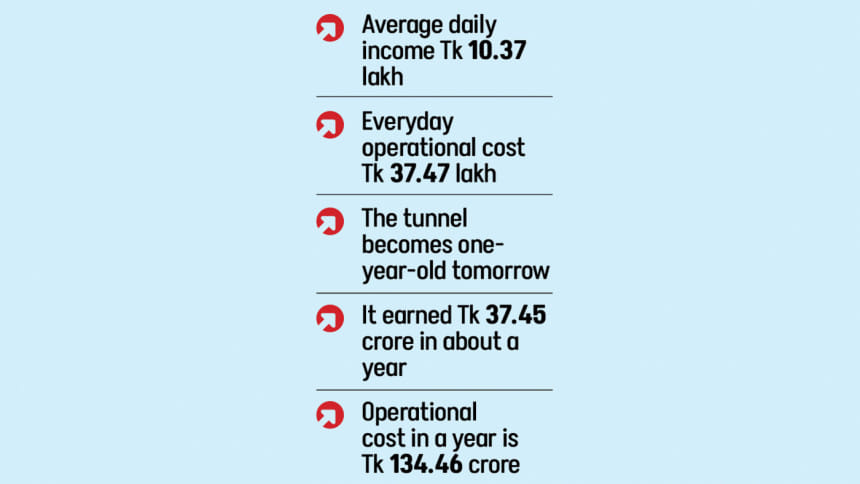
As the much-hyped tunnel under the Karnaphuli river has seen only a third of the projected traffic since it was opened a year ago, the money it earned is even less than what its maintenance required.
The country’s first tunnel, 3.32km long under the river in Chattogram, was opened to traffic on October 28 last year.
As of October 20, the average daily traffic through the Bangabandhu Sheikh Mujibur Rahman Tunnel was 3,910 vehicles. The daily average earning from the motorists was Tk 10.37 lakh, according to the data of Bangladesh Bridge Authority.
But the tunnel’s everyday operational cost is Tk 37.47 lakh, and as per a forecast report of the project from January 2023, the average daily number of vehicles using it would be 18,485 this year.
The China Construction Company Ltd has a five-year deal with the Bangladesh government to maintain the tunnel at a cost of Tk 983.82 crore.

Besides, the government is paying the interest on the $705 million loan taken from China for the tunnel. Payment of the principal amount will start within this fiscal year.
The country is now spending from its coffers to bear these expenses.
Prof Selim Raihan, executive director of South Asian Network on Economic Modeling, said the policymakers had not properly discussed how necessary a tunnel was at this particular site to connect the port city and Anwara upazila.
Since the project cost is high, there is doubt it will ever give expected return, he said.
The tunnel earned Tk 37.45 crore from 14.12 lakh vehicles since its inauguration. But the government spent Tk 134.46 crore for its operation, the data shows.
Of the vehicles that used it, almost 77 percent were light, and 12 percent were trucks.
The daily traffic exceeded 10,000 vehicles only on three occasions in the 359 days since it was opened.
Abul Kalam Azad, deputy director of the project, said the government and private development projects on either side of the tunnel have not been implemented.
The tunnel design was based on the vision of “one city two towns”, similar to Shanghai in China, he said.
“It was part of a strategy to connect the Mirsarai Economic Zone with Matarbari Deep Sea Port. There were plans to expand the Chattogram port jetty in the southern side of the Karnaphuli, proposals to establish thousands of local and foreign industrial units in Anwara. But none of that materialised. The result is, fewer vehicles than expected at the outset,” he added.
Spending on the tunnel will significantly rise once the loan repayment starts early next year, he told The Daily Star.
Nasir Uddin Chowdhury, former first vice president of the BGMEA, said the authorities had not taken the initiative to build industries that would have depended on the tunnel.
“The need for industrialisation had not been considered before building the tunnel,” he added.
Over the past few years, businesses were not interested in making new investments because of the state of the economy, he said.
Noted economist Moinul Islam said traffic through the tunnel would be heavier after the construction of the 230-km marine drive road.
“It won’t be fully utilised in the next few years, and it won’t be possible to pay loan instalments from its earnings. However, we’ll see benefits when the Matarbari deep sea port and bay terminal are fully operational,” he said.
Prof Selim Raihan said the tunnel is far from the heart of the port city.
However, there is a plan to develop a township in Anwara with Chinese funds, he said.
In November 2015, the Executive Committee of the National Economic Council (Ecnec) approved the tunnel project at a cost of Tk 8,446.64 crore. Later, the cost rose to Tk 10,689.42 crore. It was estimated at the time that the daily average traffic through the tunnel would be 28,305 vehicles by 2025 and 37,946 by 2030.
Of the fund, the Exim Bank of China committed $705.80 million or Tk 5,913.19 crore with 2 percent interest and 0.20 percent service charge, while the Bangladesh government funded the rest.
The Chinese loan needs to be repaid in 15 years, including a five-year grace period.
Daily Star









